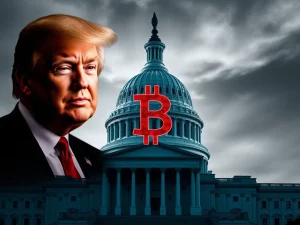Shocking TikTok Takeover: HBAR Foundation & OnlyFans Founder Launch Crypto Bid

In a surprising turn of events that merges the worlds of crypto, social media, and adult entertainment, the HBAR Foundation has teamed up with Zoop, a social app founded by the creator of OnlyFans, to make a bold move: bidding for TikTok. This isn’t just another tech company vying for the popular video-sharing platform; it’s a crypto-infused venture aiming to redefine content creation and ownership. Let’s dive into this developing story and explore what it could mean for the future of social media and the crypto space.
Why is TikTok Up for Grabs? The Looming Ban and the Divestment Deadline
The backdrop to this intriguing bid is the US government’s increasing scrutiny of TikTok’s parent company, ByteDance, due to national security concerns. A recently passed US law mandates ByteDance to relinquish ownership of TikTok, or face a ban in the United States starting April 5th. This legislative pressure has opened the door for a flurry of potential buyers, ranging from tech giants to now, surprisingly, a crypto-focused consortium. The initial deadline for divestment was January 19th, but former President Donald Trump extended it by 75 days, setting the stage for a heated bidding war. This situation presents a unique opportunity for new players to enter the social media landscape and potentially reshape its future. The question is, can a crypto-backed bid succeed where traditional tech companies are also vying for control?
The Unexpected Alliance: HBAR Foundation and OnlyFans Founder Startup Zoop
Leading the charge in this unconventional bid is Zoop, a social media startup founded by Tim Stokely, the mastermind behind the subscription-based adult platform OnlyFans. Partnering with them is the HBAR Foundation, known for its support of the Hedera Hashgraph network and its ecosystem. This collaboration brings together Stokely’s experience in building successful social platforms and the HBAR Foundation’s deep pockets and blockchain expertise. According to reports, Zoop and the HBAR Foundation have already submitted a letter of intent to bid to the US government, signaling their serious interest in acquiring TikTok’s US operations. This move is particularly noteworthy as it introduces a crypto element into the potential ownership of a major social media platform. What could this mean for content creators and users?
Revolutionizing Social Media: A Creator-Centric Vision for TikTok
Zoop co-founder RJ Phillips articulated the core philosophy behind their bid, stating, “Our bid for TikTok isn’t just about changing ownership, it’s about creating a new paradigm where both creators and their communities benefit directly from the value they generate.” This statement hints at a potentially radical shift in how social media platforms operate. Instead of the traditional model where platforms capture the lion’s share of the value generated by content creators, Zoop and HBAR Foundation seem to envision a more equitable system. This could involve:
- Empowering Creators: Leveraging blockchain technology to give creators more control over their content and its monetization.
- Community Ownership: Exploring models for community participation and potentially even governance within the TikTok ecosystem.
- Direct Value Transfer: Utilizing cryptocurrencies and blockchain to facilitate direct payments and rewards between creators and their audiences, bypassing traditional intermediaries.
Imagine a TikTok where creators are directly rewarded in cryptocurrency for viral content, or where users can support their favorite creators directly through microtransactions enabled by Hedera Hashgraph’s fast and low-cost network. This vision of a decentralized, creator-centric TikTok is certainly compelling and could be a game-changer in the social media landscape.
Challenges and Hurdles: Navigating the TikTok Takeover Terrain
While the Zoop and HBAR Foundation bid is generating buzz and excitement, it’s crucial to acknowledge the significant challenges they face. Acquiring TikTok is no small feat, and they are competing against established tech giants like Amazon, Oracle, Microsoft, and Rumble, all of whom have expressed interest. Some of the key hurdles include:
- Financial Muscle: Can Zoop and HBAR Foundation compete financially with the deep pockets of major tech corporations in a bidding war?
- Regulatory Scrutiny: The US government will heavily scrutinize any bid for TikTok, and a crypto-backed bid might face additional regulatory hurdles.
- Operational Complexity: Running a platform as massive and complex as TikTok requires significant operational expertise and infrastructure.
- User Base Transition: Ensuring a smooth transition for TikTok’s millions of users and maintaining platform stability is paramount.
Despite these challenges, the Zoop and HBAR Foundation bid injects a fresh and innovative perspective into the TikTok saga. Their focus on creator empowerment and community-driven value could resonate with both users and regulators seeking a more equitable and transparent social media ecosystem.
The Road Ahead: What’s Next for the TikTok Bidding War?
The TikTok bidding process is still in its early stages, and many details remain unclear. Crypto News Insights reached out to the HBAR Foundation and Zoop for comment but had not received a response at the time of publication. As this is a developing story, further information is expected to emerge in the coming days and weeks. The extended deadline of April 5th gives potential bidders time to solidify their offers and strategies. The world will be watching closely to see if this audacious crypto-backed bid can succeed and potentially usher in a new era for social media, one powered by blockchain and focused on empowering creators and communities. Will this shocking bid actually succeed?
In Conclusion: A Bold Crypto Play for Social Media Dominance
The HBAR Foundation and Zoop’s bid for TikTok represents a fascinating intersection of cryptocurrency, social media, and the evolving landscape of digital ownership. It’s a bold and potentially revolutionary move that could redefine how social media platforms operate and how value is distributed within these ecosystems. Whether or not their bid ultimately succeeds, it has already sparked important conversations about the future of social media and the potential for blockchain technology to create more equitable and creator-centric platforms. Keep an eye on this developing story – it could be a pivotal moment for both the crypto and social media industries.










